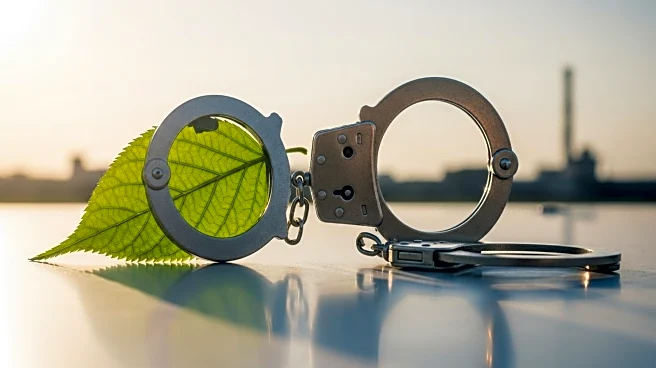What is the story about?
What's Happening?
Belgian police have successfully ended a blockade by Greenpeace activists at the Zeebrugge LNG terminal after 29 hours. The protest involved approximately 70 activists using a flotilla of small boats, kayaks, and inflatables to surround the Greenpeace vessel Witness. The demonstration was timed to coincide with ongoing EU discussions about sanctions against Russia, specifically targeting Russian gas imports. Greenpeace is advocating for a halt to all fossil gas supply contracts, including U.S. LNG imports, with a phase-out by 2035. The blockade disrupted the flow of LNG carriers, including vessels from Norway, Spain, and the U.S., which were forced to delay their arrivals. The terminal, operated by Fluxys, is one of Europe's largest and serves both imports and transshipment of LNG.
Why It's Important?
The Greenpeace blockade highlights the growing tension between environmental advocacy groups and the fossil fuel industry. By targeting LNG terminals, Greenpeace aims to draw attention to the environmental impact of fossil fuels and push for a transition to renewable energy sources. The protest underscores the broader debate within Europe about energy dependence, particularly in light of geopolitical tensions with Russia. The disruption of LNG shipments could have implications for energy supply and prices, affecting both European and U.S. stakeholders. The incident also raises questions about the balance between environmental activism and economic interests, as well as the role of law enforcement in managing such protests.
What's Next?
Following the removal of the blockade, LNG carriers are expected to resume their schedules, with delayed vessels arriving at the terminal in the coming days. Greenpeace has indicated that it will continue its campaign against fossil fuels, suggesting potential future actions. The EU's ongoing discussions about sanctions against Russia may influence energy policies and contracts, potentially impacting U.S. LNG exports to Europe. Stakeholders in the energy sector will be closely monitoring these developments, as they could affect market dynamics and regulatory frameworks.
Beyond the Headlines
The Greenpeace protest at Zeebrugge reflects a broader shift in environmental activism, where direct actions are increasingly used to challenge established energy practices. This approach raises ethical questions about the methods used by activists and the responses by authorities. The incident may also contribute to a growing public discourse on the urgency of addressing climate change and transitioning to sustainable energy sources. Long-term, such protests could influence policy decisions and corporate strategies, as companies and governments seek to balance environmental concerns with economic and energy security.















